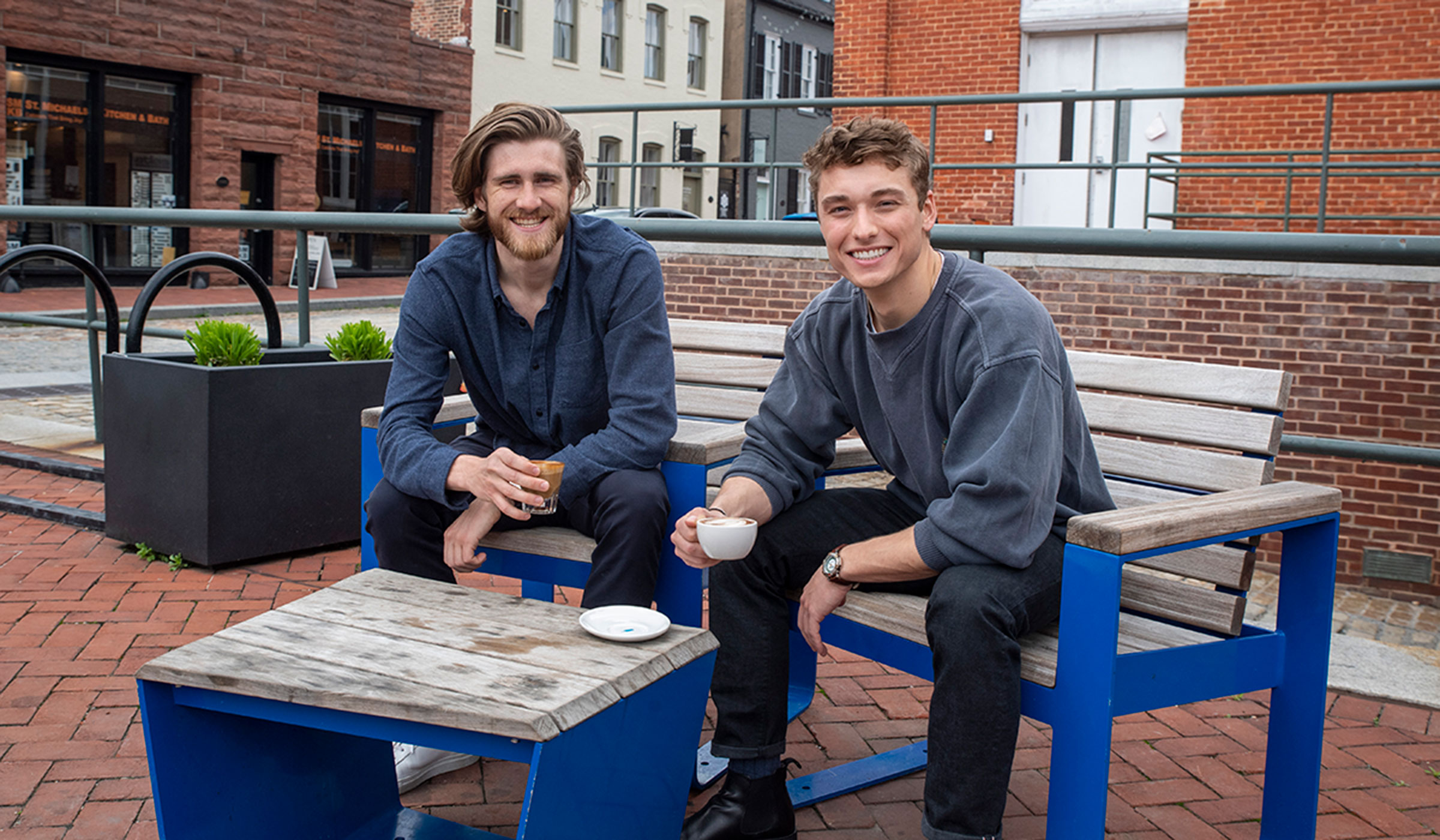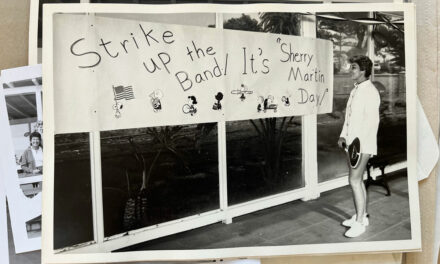
Revolutionizing Urban Student Housing


Revolutionizing Urban Student Housing
Harry Dubke ’15 and Perry Griffith ’15 talk about building their startup, Cortado
ARTICLE BY MELLISSA ULSAKER MAAS ’76
PHOTOGRAPHY BY JAMESON BLOOM ’13
It all began in Dr. Klein’s tenth grade English class, where SSSAS classmates Harry Dubke ’15 and Perry Griffith ’15 were first paired together on a group project. The two became fast friends, buoyed by a shared interest in languages and the fact that their childhood homes sat less than a mile apart.
In 2015 the two parted ways for college, but remained steadfast friends throughout their undergraduate years. Harry headed to Hamilton College, receiving a bachelor’s in world politics and hispanic studies, while Perry graduated from the University of Virginia’s McIntire School of Commerce with a bachelor’s in finance and real estate. During their undergraduate studies, they also attended a summer session at the London School of Economics alongside several other SSSAS alumni; an experience that would spark the travel bug in both of them. Perry soon returned to Europe to live and study in Barcelona, Spain, for a semester, while Harry spent nearly five months at the University of Buenos Aires, attending classes entirely in Spanish on everything from social protest to genocide studies. After graduation, Perry worked for several years in real estate private equity in New York City, while Harry joined a non-profit focused on Latin America.
It was their experiences abroad, however, that ultimately planted the seed for their leap into startup life. In 2021 the pair co-founded Cortado, a DC-based startup providing flexible, fully-furnished stays for the city’s visiting interns and students. They envision Cortado as a disruptor in the $2.4 trillion global student housing market by tapping into growing demand for short-term stays in popular urban centers like Washington, D.C. Short-term experiential learning has exploded both in the U.S. and overseas—with study abroad growing 7% annually for the last five years—yet traditional student housing companies focus on university towns and rural campuses, leaving urban markets vastly undersupplied.
With Cortado, they aim to address this massive undersupply by providing professionally managed, apartment-style living at a competitive price, with elegant software to make the housing coordination and management experience frictionless from anywhere in the world.
I talked to Harry and Perry about their startup journey, hopes, and dreams for the future of Cortado.
MM: How and when did you decide to form a partnership and how/why did you focus on intern/student housing? What inspired this?
HD: Perry came to me with the idea for a study abroad housing platform back in 2020, while we were still working our first post-grad jobs. The concept really emerged from our own experiences studying abroad together in London and then later separately; myself in Buenos Aires and Perry in Barcelona.

“The concept came from my own experience searching for housing in Barcelona—despite the popularity of the city among Americans and Europeans studying abroad, there was no way for international students to consistently find safe, affordable housing in the city center.”
– PERRY
PG: The concept came from my own experience searching for housing in Barcelona—despite the popularity of the city among Americans and Europeans studying abroad, there was no way for international students to consistently find safe, affordable housing in the city center. My classmates and I ended up staying in a youth hostel for nearly three weeks before finding a local landlord who would only accept rent payments in cash-stuffed envelopes! Needless to say, I began to suspect there was a better way to handle housing abroad.
MM: What background and skills do you each bring to the table?
PG: Harry’s background in international development and exceptional communication skills— in English and Spanish!—have been instrumental in building customer relationships and generating brand awareness. I’m thankful I can add value from a finance and real estate perspective, which has facilitated our conversations with property managers and early-stage investors.
HD: Perry certainly has the bulk of the experience when it comes to real estate, so I really lean into my non-profit experience and prior work with Latin American youth groups to appeal to the academic programs that we work with in D.C. and beyond. It can be really difficult to sell a new product to big universities, so my familiarity with the bid process and student-faculty relations has really been a boon for us early on.

“My advice to any wannabe founder is to first, write down your idea, and second, start calling as many people as possible who know more than you about the space.”
– HARRY
MM: How much time did you put into researching the need, opposition, and viability of starting Cortado?
HD: Once we had a rough idea of the business model, the first thing we did was to cold call as many study abroad programs as possible to see if this was a product that they needed. I am constantly surprised by how much information people are willing to volunteer about their jobs if you just ask politely! My advice to any wannabe founder is to first, write down your idea, and second, start calling as many people as possible who know more than you about the space. We’ve since spoken with students and program administrators from Bilbao, Spain, to Lausanne, Switzerland, and we keep getting the same response: “Let us know when you have units in my city, and we’ll rent from you.”
MM: Why did you name the company after the coffee beverage? What’s the story behind that?
PG: So the story behind Cortado…well Harry and I both enjoy coffee—we sussed out most of the business model while heavily caffeinated—but the real appeal comes from the word’s connotations in Spanish. For Spanish-speakers, “cortado” describes something that is clipped or shortened; much like how Cortado the company provides a simplified way to find short-term stays in a new city or country! Harry and I also like how the name can be easily pronounced in romance languages, which are spoken in many of the countries where Cortado will soon be operating!
MM: Where is the greatest growth in need for intern/student housing? What’s your target market?
HD: Washington, D.C., is a perfect case study for this type of student and intern housing. We have the highest concentration of off-campus programs in the country here (Perry and I have counted nearly 50), and the housing market is horrendously difficult to navigate. After D.C., we see a huge potential in western and southern Europe, where the bulk of U.S. study abroad ends up alongside hundreds of thousands of European students traveling through the EU’s ERASMUS+ exchange program. Cities like Granada, Milan, and Grenoble have huge student populations with almost no student-dedicated housing options, which make them perfect sites for Cortado’s first units abroad.
MM: Your plan is to work directly with university programs to supply housing, is your marketing strategy working?
PG: So far we’ve seen a ton of interest from D.C.-based programs (in the form of several RFPs), but our early experiences with programs will be huge for proving out Cortado’s business model! I think the key here is snagging B2B contracts in D.C. as soon as we can; we really see that as the golden ticket to expansion.
HD: Exactly, many of the university administrators running programs in D.C. also run their schools’ programs abroad. We had one program director tell us that if we could successfully house her program’s students in D.C., she would like to use Cortado for her university’s programs in Boston and Berlin, too!
MM: There are a number of options for intern/student housing in D.C., Boston, and New York, what makes Cortado different?
PG: In a few words: design, service, and community. We are really the only provider to relentlessly focus on this slice of the student and intern housing market. The incumbents we face are mostly crowded, old-school dorms and stuffy, overpriced corporate housing companies —two options that students and administrators alike have repeatedly lambasted in our customer interviews.
HD: Cortado focuses on creating spaces designed from the bottom up for young people like ourselves. Centrally located, tastefully furnished with plenty of space to work from home, all at an affordable price. In an industry like real estate that naturally distrusts the under-30 demographic, Cortado is creating a space for our generation to get on their feet in urban centers like D.C. and beyond.
MM: Is your plan to launch first in Washington, D.C., and then expand to New York and Boston? What is your goal for each location?
PG: Each new city brings its own unique set of challenges and opportunities for expansion; differing short-term rental laws, supply constraints, and even local customs have to be taken into account. Yet our initial approach is always the same: 1) Identify the customers, 2) Listen to their needs, 3) Source and design spaces that consistently exceed expectations. From day one of operation, our goal is always to create spaces that we wish we could have lived during our own time abroad.
MM: What are the projected unit economics and when do you expect to be profitable?
PG: Today, it’s common to see early-stage companies incur persistent losses in pursuit of high growth rates and dominance in a particular market. Thankfully, Cortado’s unit economics in Washington, D.C.—one of the tightest housing markets in which the startup will operate—support profitability by month four of operations. Of course, this assumes we successfully lease out our units!
MM: How much funding do you need to raise to make Cortado a reality this summer?
HD: We’ve already hit our pre-seed funding goal to get our first units up and running by May 2022. That said, we are always interested in speaking to anyone in the SSSAS network who is looking for an opportunity to invest in a couple of young alumni!
MM: If Cortado is successful in D.C., Boston, and New York, will you consider expanding to other cities?
PG: Absolutely! We have our sights set mainly on continental Europe for the 2023-2024 academic year, but hope to open up less traditional study abroad markets in places like South America and Southeast Asia. This business truly works best at scale, where we can expand alongside study abroad programs and create a network of housing for young people everywhere, opening up travel and exchange opportunities for the next generation of students and young professionals, while expanding access for those who might not otherwise have the chance to see the world.

“This business truly works best at scale, where we can expand alongside study abroad programs and create a network of housing for young people everywhere.”
– PERRY
MM: What is your ultimate dream for Cortado? If it’s successful, where do you see yourselves in ten years?
HD: This is our most important question as founders… It is an oft-repeated truism to claim that “globalization has flattened the world” in terms of communication and the exchange of goods and services, but what about cultural exchange? Cultural exchange—sitting down face-to-face with somebody from a wildly different upbringing and background than yours—is a deeply personal experience, and not one that is reproduced easily through a computer screen.
PG: I see Cortado as fostering this type of cultural exchange by allowing more and more young people to travel to foreign places and to interact with the diverse cultures that inhabit them. I want us to look back in ten years and count the thousands—millions—of young people that Cortado helped bring overseas through an ever-growing network of stays around the world.

Visit Cortado at livecortado.com
and reach the founders at
perry@livecortado.com
harry@livecortado.com




